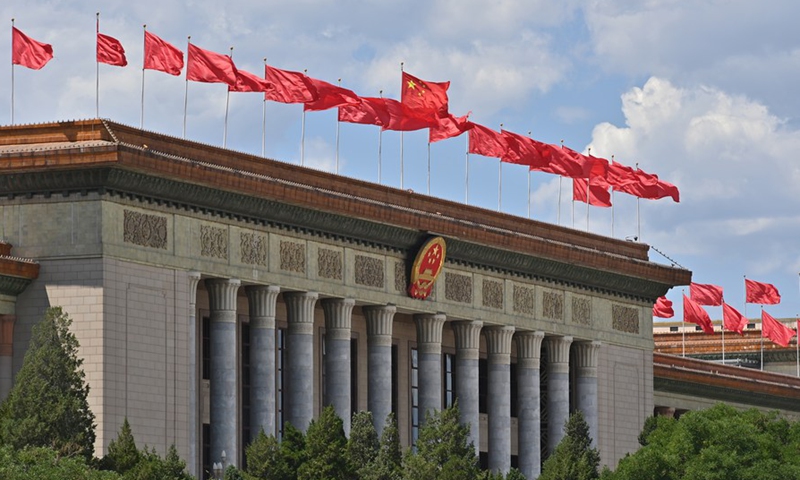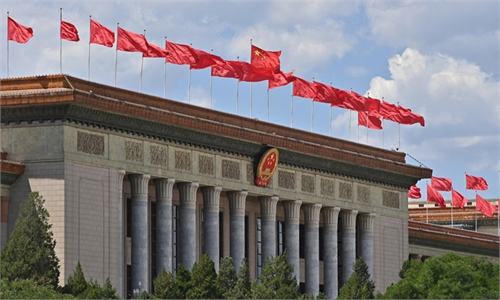China passes its first foreign relations law in key step to enrich legal toolbox against Western hegemony

Photo:Xinhua
China's top legislature passed the Foreign Relations Law on Wednesday, marking a milestone significance as it is the first fundamental and comprehensive foreign relations law that aims to fix the loopholes in the rule of law in foreign-related affairs amid new challenges in foreign relations, especially when China has been facing frequent external interference in its internal affairs under the Western hegemony with unilateral sanctions and long-arm jurisdiction.
The law will take effect on July 1. Divided into six chapters, the legislation stipulates the guidance and basic principle of foreign relations and specific provisions on the functions and powers of foreign relations, the objectives and tasks of the development of foreign relations, the legal system of foreign relations, and the capacity building and guarantee for the development of foreign relations, according to the approved version.
Some legal experts said that the law inherited China's long-term diplomatic stance and its position on international rule of law, upgrading policies and systems for foreign affairs management to national law, legally interpreting and elaborating on a series of new ideas and initiatives in global governance. With the implementation of the law and the introduction of more legislation on foreign affairs in the future, China's ability to defend its interests and people through legislations will be continuously improved, they noted.
The National People's Congress (NPC) issued the draft of the law in December 2022, and the Legislative Affairs Commission of the Standing Committee of the NPC says the draft legislation has the support of NPC deputies; members of the advisory body - the Chinese People's Political Consultative Conference; legal experts and the public.
The enactment of the law also came after a report to the 20th National Congress of the Communist Party of China (CPC) last October called to step up legislation in key, emerging, and foreign-related fields and advance the rule of law in domestic and foreign-related affairs in a coordinated manner, so that good laws are made to promote development and ensure good governance.
"In recent years, the changes of external environment have brought new conflicts and challenges for China, and the loopholes in the rule of law in foreign-related affairs are gradually revealed," Huo Zhengxin, a law professor at the China University of Political Science and Law, told the Global Times on Wednesday.
On one hand, in the face of some Western hegemony frequently interfering in China's internal affairs by "law" and imposing unilateral sanctions and "long-arm jurisdiction," China has not yet established a comprehensive preparedness system and an effective blocking mechanism, and the "shield" of the rule of law in foreign-related affairs has not been fully established, Huo noted.
On the other hand, in terms of safeguarding China's sovereignty, security and development interests, there is still a shortage of institutional supply in terms of law, and the "spear" of the rule of law in foreign affairs needs to be accelerated, he noted.
While China has been facing growing challenges including export control measures and sanctions, toward which international law has failed to provide adequate remedies, the Foreign Relations Law has also been considered as necessary and a major progress in domestic legal framework to regulate foreign relations, experts said.
Important, necessary step
The Foreign Relations Law stipulates that, on the basis of abiding by the basic principles of international law and the basic norms governing international relations, the country shall strengthen the implementation and application of laws and regulations in the field of foreign affairs, and take law enforcement, judicial and administrative measures in accordance with the law to safeguard China's sovereignty, security and development interests, and protect the legitimate rights and interests of Chinese citizens and organizations.
China has the right to take necessary countermeasures in accordance with the law against acts that violate international law and the basic norms governing international relations and endanger China's sovereignty, security and development interests. The country shall formulate necessary laws, administrative regulations and departmental rules, establish corresponding working systems and mechanisms, strengthen coordination among departments, and establish and implement relevant countermeasures and restrictive measures.
"For the first time, the law states the purpose, conditions and policy orientation of the application of Chinese law in foreign relations, and stipulates principles for the measures to counter and restrictive measures against foreign countries, individuals or organizations," Huang Huikang, a professor of the Institute of International Law of Wuhan University, told the Global Times on Wednesday.
It also establishes corresponding working systems and mechanisms, so as to construct the basic legal system framework for Chinese law in extraterritorial application, Huang said.
The extraterritorial application of domestic law is an important part of the rule of law in foreign-related affairs, and exterritorial application of domestic law is the concrete embodiment of protective jurisdiction and universal jurisdiction recognized by international law, and is a supplement to personal jurisdiction and territorial jurisdiction, the expert noted.
"What we object to is the abuse of so-called 'long-arm jurisdiction'," he said.
The law stipulates that the goal of developing foreign relations includes developing a global partnership and promoting an all-round, multi-level, wide-ranging and three-dimensional external work layout, promoting the coordination and positive interaction among major countries.
The US is the only sanctions superpower in the world. According to the Treasury 2021 Sanctions Review by fiscal year 2021, the number of active US sanctions designations had increased to more than 9,400, according to a report released by the Chinese Foreign Ministry in February on US' long-arm jurisdiction. In recent years, China has been subjected to mounting US sanctions over a series of matters such as high-tech, Xinjiang and Hong Kong as well as the Ukraine crisis.
"The formulation of the Foreign Relations Law is a major legislative measure to accelerate the construction of the rule of law in foreign-related affairs and fix the loopholes in the field, which also marks an improvement in China's ability to carry out international struggles and safeguard the interests of its country and people through the rule of law," Huo said.
The law also provides a legal basis for the diplomatic struggle against sanctions, anti-intervention and long-arm jurisdiction, and aims to constantly enrich the legal toolbox and develop the ways and means to safeguard national interests, which could also play a role of prevention, warning and deterrence against Western hegemony, experts noted.


